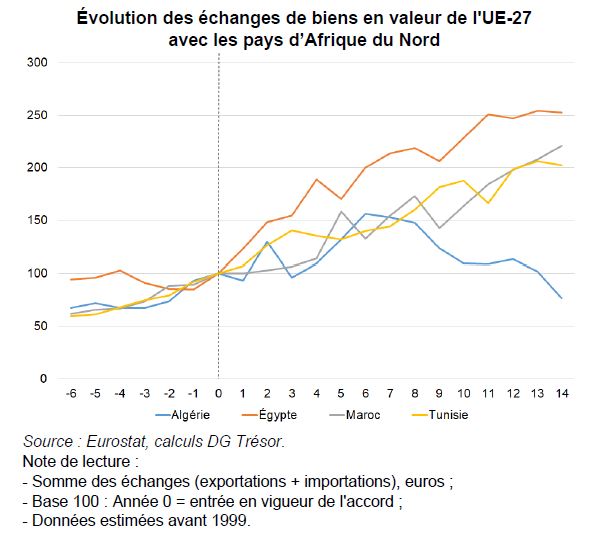EU-North Africa Association Agreements and Trade Integration
The association agreements between the European Union and North Africa, concluded from the end of the 1990s, have encouraged an increase in trade between the two shores of the Mediterranean and an intensification of trade in certain industrial sectors. However, the EU's market share has declined as a result of the growth of emerging countries. New avenues of cooperation with North African countries could strengthen Euro-Mediterranean value chains.
Starting in the late 1990s, the European Union (EU) entered into four association agreements with North African countries – Tunisia in 1998, Morocco in 2000, Egypt in 2004 and Algeria in 2005 – containing provisions for economic, trade and financial cooperation with a view to gradually establishing a Euro-Mediterranean free trade area. The agreements have spurred the growth of trade between northern and southern Mediterranean countries, although EU market share has come under pressure from the rise of emerging countries, especially China and Turkey. Also, the comparative preferences warranted by the agreements have diminished over time, with the EU entering into deeper and more ambitious agreements with other trading partners. Ever since the agreements came into force and owing to the impact of these two trends, North Africa's trade balance with the EU has deteriorated, but to a lesser extent than with the rest of the world.
As the association agreements were implemented, trade within a number of industrial sectors rose, aiding the development of Euro-Mediterranean value chains, chiefly in the automotive and aerospace sectors.
The 1995 Barcelona Declaration, which brought about the association agreements, also sought to boost intra-regional trade in North Africa. These countries have, however, made little progress in economic and trade integration.
With negotiations for Deep and Comprehensive Free Trade Agreements (DCFTAs) currently at a standstill, despite the alignment of EU and North African interest in deepening trade relations, the European Commission is exploring a more flexible approach to trade in order to increase business ties with North Africa. One such new cooperation arrangement could involve harmonising regulations governing industrial products in order to create and expand North-South and South-South industrial partnerships in the Mediterranean region.
